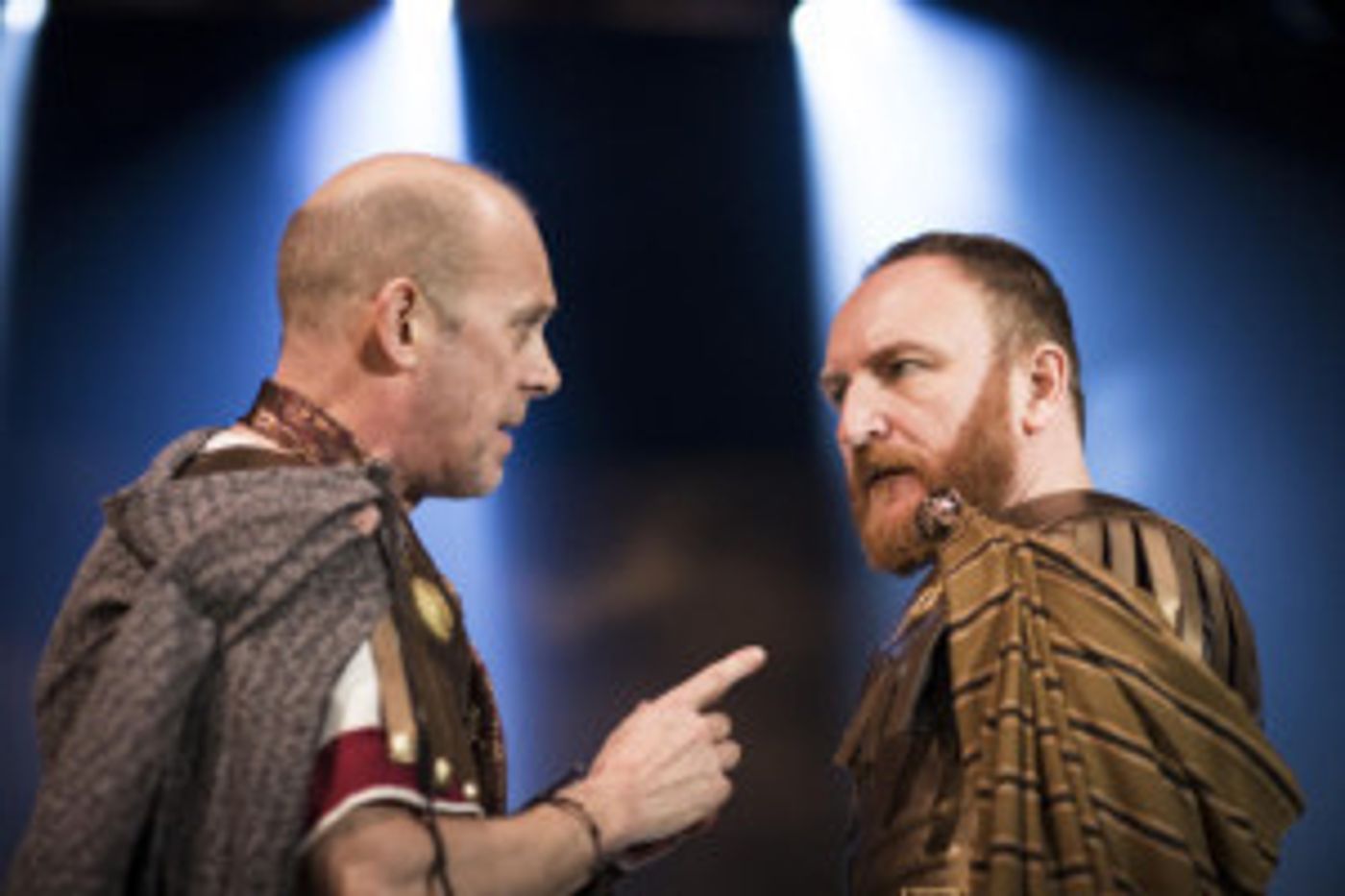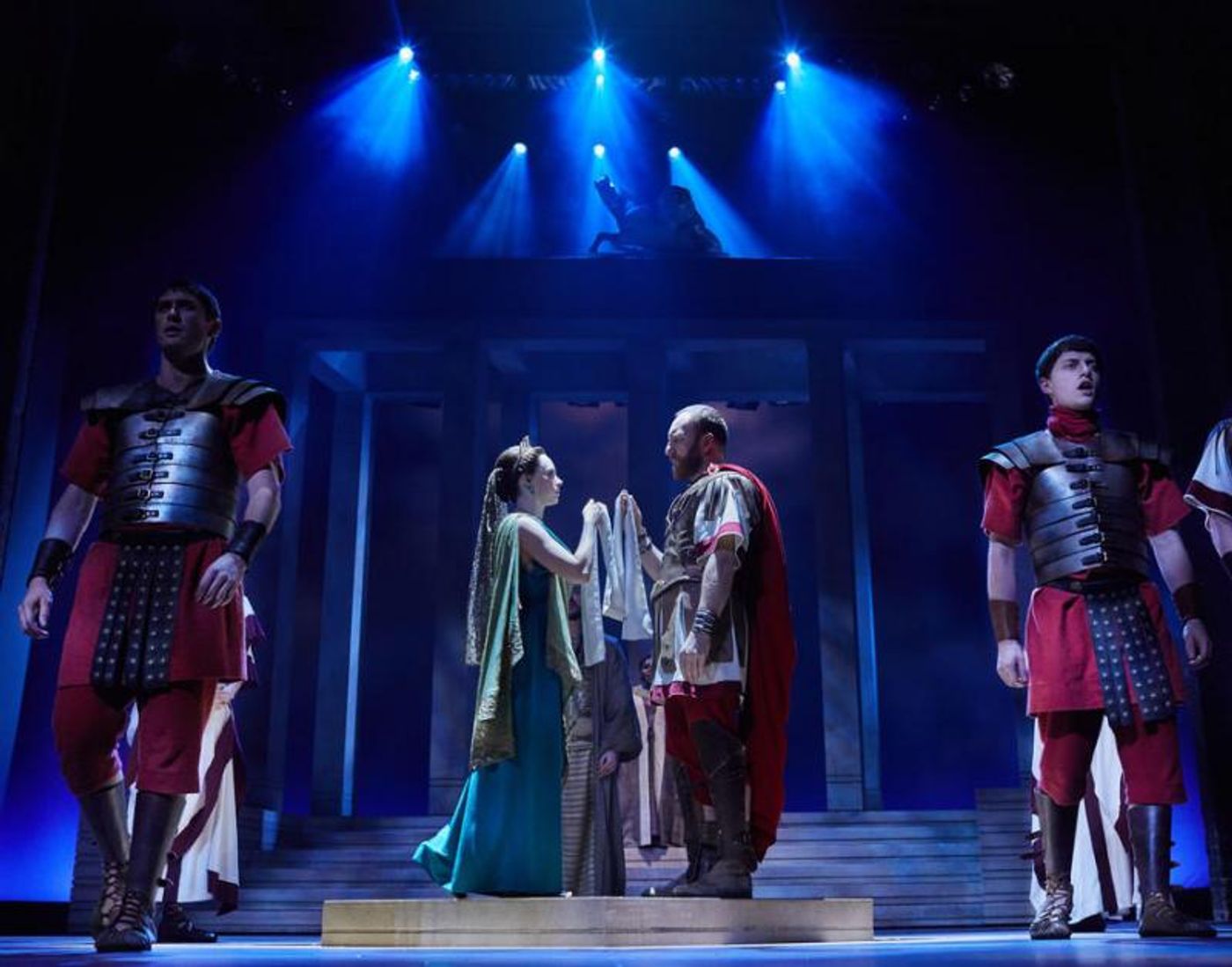Interview: Antony Byrne Talks ANTONY & CLEOPATRA

in Antony & Cleopatra
Rome wasn't built in a day...but the Royal Shakespeare Company's Rome MMXVII Season comes pretty close! As performances get underway for Julius Caesar, rehearsals begin for the Barbican transfer of Antony & Cleopatra.
Playing the titular role, Antony Byrne takes us through his time at the RSC, from audience member to actor.
What were your first experiences with Shakespeare?
Well, I actually encountered his work via the Royal Shakespeare Company quite early on. I grew up in the North-East and the RSC would come to the Newcastle Theatre Royal, so we were really lucky.
They also had this mobile touring unit, which no longer goes out. And I think that's a real shame, because I remember going to places like Newbiggin-by-the-Sea! And it would be a wet and windy night in February, and I'd be there watching Nigel Terry and Fiona Shaw doing The Merchant of Venice. And that was quite extraordinary.
But like most people, my very first experience with Shakespeare was at school. We did the Tybalt and Mercutio fight out on the back fields, driving each other over this little hill! And I just remember thinking, "God, this is great! This is really good fun." It's those kinds of teachers who make you go, "Oh right, this lifts off the page!".
Getting it up on its feet: bandying with blows, but also with words.
Yes, exactly! And it's always been the language, it's always been. It says things to me. And as I go through my life, it says different things to me. Just the other night, somebody said, "What's your favourite Shakespeare play?" And I can't do that, because they mean different things at different points in my life.
Greg Doran talks about it, they're like iron filings: certain things start to vibrate depending on what is happening in the world. I think that that's really true.
So how did you get into acting?
I escaped! I grew up in a little seaside town and it's like that Morrissey song: "The seaside town that they forgot to shut down".
I do love it! But when you're a teenager, the one thing you want to do is escape. I wanted to go to drama school but I was quite prescriptive, and for some reason Central School of Speech and Drama was the place that I wanted to go.
So I got the overnight bus from Newcastle, and it was back when smoking was still allowed on buses. And I've never been a smoker, but I would fall off this bus at 6:40 in the morning reeking of smoke and going straight to auditions at Central!
And they took me, God bless them! So I did three years at Central and it was fantastic training.
And how did you continue to hone your craft after that?

Well, when I left drama school, I had a real bee in my bonnet about being a theatre actor. It was really important to me that I understood the workings, the machinery, the technical nature of what it is to really hone your work.
I did a season at the Crucible in Sheffield, in As You Like It and True West with Jason Watkins, who is a fantastic actor. And I think that's it: surrounding yourself with good people.
And at the RSC, they afford you that. The times I've sat in a rehearsal room in a read-through, next to Michael Pennington the first time he did "This sceptred isle" in Richard II. And all I could do was look at him and go, "Alright. Time to raise your game."
And you know, those people nurture. They want you to do well, they see the value in the work. They have an absolute love of Shakespeare and they want it to carry on.
You mentioned your first encounter with the RSC as an audience member. When did you first join the company as an actor?
Well, I actually met the character of Mark Antony the first time I worked for the RSC. I did two plays in the 1995 season: I worked with Peter Hall on Julius Caesar, and I worked with Katie Mitchell on The Phoenician Women.
And I actually did Antony & Cleopatra not that long after too. In that production, Alan Bates played Antony and I loved him. I just thought he was such a generous man.
And now you're revisiting Antony & Cleopatra?
Yes, almost 20 years down the telescope. The company said, "Do you want to come and play Antony?" And you go, "Yes, absolutely! I want to do that!" I want to bring the experience that I've had over the course of my career up until now, and it's a real gift to be allowed to play these parts.
It's going back to that point earlier: coming at plays at certain points in your life. You kind of gradually build up a library of history with it.

So what's your take on Antony now?
It's really interesting. There's this whole thing about this great love story between them...and what I've found fascinating is that they don't actually realise what love is.
They don't understand what it is to love someone else until the second half. After the Battle of Actium's happened and everything's collapsed, it's then they have to face up to each other: "OK, who are we? What are we? What do we want?"
Because at the end of the day, no matter how famous you are, it's going to be two of you in a room facing each other. And you can't hide. You can't pretend to be the big war lord, general, one third of the world when you're facing the one person who has your number!
And audiences can see the origins of that war lord figure in Julius Caesar, with James Corrigan (Mark Antony).
Yes. And for me, this is a very different play from Julius Caesar. There, we see Antony in his youth and on the rise. And I came up with this image: here, Octavius is the coming man, and Antony's the falling man.
What is it to not be able to be the big pillar of the world, which everybody expects him to be for all of time? And we see it across the world, where people hold on for too long and their powers wane and they don't see it. Once you've been given it, how do you give that up?
What was it like bringing Antony & Cleopatra before audiences at the Royal Shakespeare Theatre?
I've been very lucky, I've spent a lot of time in the RST over the last few years. I love it as a playing space. I mean the old RST when you used to stand behind the pros[cenium arch] and shout at the back, it was a really difficult space to play.
But because it's a thrust stage, that means that your relationship with the audience is so much more intimate. You can have that conversation and really ask questions of people. And you can feel when they're with you, and when the bums get a little rustly! But I find it a really exciting space to play. It's very alive.
And how do you think audiences at the Barbican will compare?

Well, I've played here a number of times, so that's again about developing a relationship with a space and a theatre.
And I've learned that it's very different. It's so much wider and the audience feel like they roll away from you, like a big wave. And you're just waiting for it to come rolling back at you, in terms of responses.
But it can be very accommodating. And you do that thing in previews, where you go and sit up in the gods and stare down. I mean, when I come and see shows here, I'm looking at little people seemingly miles away!
And your experience on the stage is very different; you just feel like they're contactable. So it's good to go out there and go, "Oh right, I really need to think about the last person on that back row."
Why do you think these Histories still prove so relevant today?
I think they're vitally important in terms of what Shakespeare says about the common man, about the populus. And about the fact that if those in power don't watch it, they're always going to come and bite you on the arse. The people have the power.
I love that debate between the populus and the powerful: how they kind of exist with each other, or don't. And when they don't, how that works its way through.
So why should people come and see these shows?
I think part of it is the notion of seeing all four. For me, it's been an absolute joy to be in one, and then just go and sit in the auditorium and see the development of the others.
And I'm a convert! So I'm always going to say, "Come and watch them!" Because I love them and I just think that they're brilliantly written. Shakespeare is really testing his actors in this and the audience too, seeing how far he can play and push.
Rome MMXVII Season at Barbican Centre until 20 January, 2018
Antony & Cleopatra, 30 November-20 January, 2018
Photo credit: Helen Maybanks
Check out our interview with Martin Hutson, playing Cassius in Julius Caesar
Powered by
|
Videos

